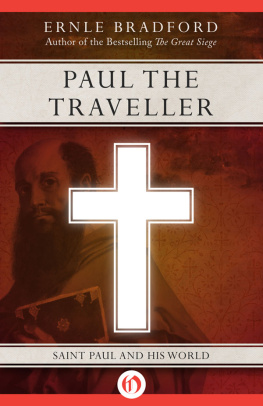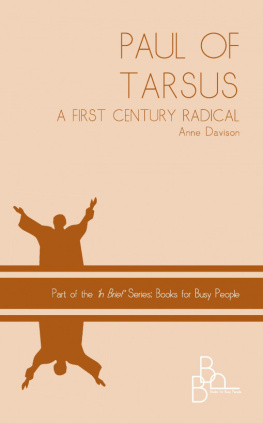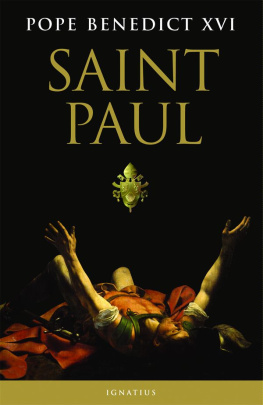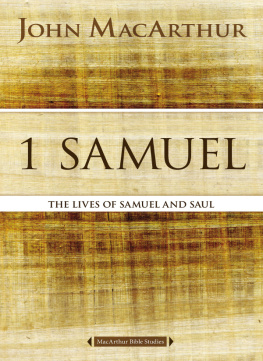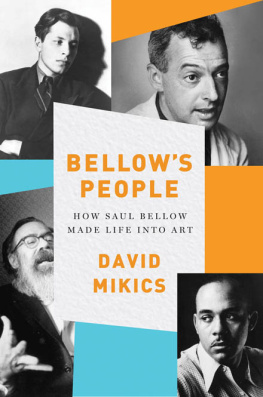Saul The Traitor!
A Fictionalized Biography of the Apostle Paul
Ted Bradshaw
Copyright 2016 by Ted Bradshaw.
ISBN: | Softcover | 978-1-5144-7353-5 |
eBook | 978-1-5144-7354-2 |
All rights reserved. No part of this book may be reproduced or transmitted in any form or by any means, electronic or mechanical, including photocopying, recording, or by any information storage and retrieval system, without permission in writing from the copyright owner.
Any people depicted in stock imagery provided by Thinkstock are models, and such images are being used for illustrative purposes only.
Certain stock imagery Thinkstock.
Rev. date: 07/16/2016
Xlibris
1-888-795-4274
www.Xlibris.com
737899
Contents
Speculations on the journey St. Saul took to arrive at meeting Jeshua on the road to Damascus, and from there to the meeting with Peter in Jerusalem. This is not history. It is speculation drawn from factual information from both the Scriptures and the period.
We know next to nothing of the man, Saul of Tarsus. Sauls home was Tarsus. He was a Jew and proudly a Pharisee. More importantly, he was a zealot He studied under the great Rabbi, Gamaliel. We know nothing of his father, not even his name, except he was a Roman citizen. Since Sauls living came from tentmaking, we can speculate that his father was a tentmaker, and Saul learned the trade under his fathers tutelage. In his many writings he never speaks of his mother or sibl ings.
Citizenship was hard to come by for a non-Roman, particularly so for a Jew. Perhaps he had distinguished himself in one of the numerous Roman wars. Perhaps he had done a great favor for an influential Roman. Regardless, Sauls father was awarded Roman citizenship that was hereditary, so through his father Saul was also a citizen of Rome.
From his writings we can justly assume Saul was a well educated man. The fact that he was writing in the A.D. 60s and was martyred ca. A.D. 68 we can assume he was born about the time of Jesus birth. Beyond these paltry facts, we can only specu late.
I will endeavor to recreate Sauls life and experiences on the basis of what we do know from the Scriptures and from 1 st century Jewish culture. To this I will add what, I trust, are logical suppositions. Thus starts the fictionalized history of Saul, who with the beginning of his ministries to the Gentiles, became the Apostle Paul.
Saul grew up in a university town and a center for both knowledge and culture. For Saul, Greek, Roman and Jewish culture were the milieu in which he lived. He likely went to school at the same time Herod Antipas and his foster brother, Manaens (who later became a Christian prophet-teacher in Antioch). His given name was Saul. He probably spoke Hebrew, Aramaic, Latin and Greek. Likely he studied Greek philosophers. Saul probably read enough Greek philosophy to realize it was a blind alley spiritually. This led him to embrace Judaism with fervor. While he might have studied Gentile thought as the son of a Pharisee, Saul would never have had any personal dealings with Gentiles. He would have kept his distance so as not to become defiled. His regular attendance at synagogue and his prominence in business likely brought Saul to the attention of the Elders of the synagogue. His scholarship and studies under Gamaliel made him a prime candidate to be asked often to line, i.e. read the Torah. His appreciation of the Scriptures likely lent such ardor to his reading that people appreciated him. Besides, he and his father likely contributed generously to the synag ogue.
To become a Pharisee, he had to be profoundly educated in the Torah. That occurred under the tutelage of Gamaliel, one of only seven rabbis to be given the esteemed title of Rabban . Gamaliel means reward of God. He lived in Jerusalem, so it is most likely Saul went to live there while under Gamaliels instruction. Scripture makes it clear that this Rabbi was a devout believer in Gods sovereignty. When called upon to comment on the heresy of the Apostles Peter and John, Gamaliel took the middle ground. If their faith is not of God it will soon run its course and fade away; however, if it is of God and the Sanhedrin chooses to condemn the Apostles, they may discover they are resisting God. He was respected enough that even though his advice went against the engendered hate of the Sanhedrin members, they acceded to his wisdom. His advice is also based on Jewish pragmatism, i.e. what succeeds is of God and what fails is evil. After his death, the Talmud gives him this accolade, Since Rabban Gamaliel died, the glory of the Law has ce ased.
Saul, as a zealous Jew, would have kept strict separation from Gentiles to remain ceremonially clean. Likely, while youthful, he had been a respected and well-to-do Jew. If he were in his thirties, he may have been selected for the council of the elders of Judaism, if Sauls zeal for the Law brought him to the attention of influential members of the Sanhedrin. At the time of Jeshuas (Jesus) crucifixion, Saul may have recently been appointed as Pharisee and a member of the Sanhe drin.
Also as a resident of Tarsus, he would not have qualified; however, if he took up residence in Jerusalem, Saul would qualify. Whether or not he was a member of the Sanhedrin, Saul could have been employed by the Sanhedrin to carry out its directives, and would likely do so enthusiastic ally.
A zealous Jew and well-to-do, Saul would have traveled to Jerusalem to attend the five festivals of Judaism - Passover, Pentecost, Trumpets, Day of Atonement and Tabernacles. Each trip would consume two or maybe three weeks considering the slow travel and the length of the various feasts. If he could afford to be absent from his business in Tarsus nearly 20% of the time, he was likely quite well off. He must have had responsible slaves, as well as a responsible ste ward.
Being in Jerusalem that often and for such lengths of time, it would make sense to have a branch office in the home of the Jews. If Saul had a tentmaking establishment in Jerusalem, he would have another accomplished steward, as well as a second home. Regardless, Saul was most likely often in communication with the Jerusalem Pharisees and with members of the Sanhedrin. He was probably well acquainted with their concern about the Nazarene carpenter. People who know others who share their views tend to talk freely about their conc erns.
Observations by John Lord, LL.D. (1810-1894), Professor of History at Dartmouth College, Beacon Lights of History , Vo. 1, Part II, Wm. H. Wise, Co., New York, Pgs. 451-453. He taught for forty years on the history of the world and the characters who formed it. This collection comprises his lect ures.
As a man Paul had his faults, but his virtues were transcendent; and these virtues he himself traced to divine grace, enabling him to conquer his infirmities and prejudices, and perform astonishing labors, and to endure no less marvelous sufferings. His humanity was never lost in his discouraging warfare; he sympathized with human sorrows and afflictions; he was tolerant, after his conversion, of human infirmities, while enjoining a severe morality. He was a man of native genius, with a profound insight into spiritual truth. Trained in philosophy and disputation, his gentleness and tact in dealing with those who opposed him are a lesson to all controversialists. His voluntary sufferings have endeared him to the heart of the world, since they were consecrated to the welfare of the world he sought to enlighten. As an encouragement to others, he enumerates the calamities which happened to him from his zeal to serve mankind, but never complains of them or regards them as a mystery, or as anything but the natural result of unappreciated devotion. He was more cheerful than Confucius, who felt that his life had been a failure; more serene than Plato when surrounded by admiring followers. He regarded every Christian man as a brother and a friend. He associated freely with women, without calling out a sneer or a reproach. He taught principles of self-control rather than rules of specific asceticism, and hence recommended wine to Timothy and encouraged friendship between men and women, when intemperance and unchastity were a scandal and a disgrace of the age; although so far as himself was concerned, he would not eat meat, if thereby he would give offense to the weakest of the weak-minded brethren. He enjoined filial piety, obedience to rulers, and kindness to servants as among the highest duties of life. He was frugal, but independent and hospitable; he had but few wants and submitted patiently to every inconvenience. He was the impersonation of gentleness, sympathy, and love, although a man of iron will and indomitable resolution. He claimed nothing but the right to speak his honest opinions, and the privilege to be judged according to the laws. He magnified his office, but only the more easily to win men to his noble cause. To this great cause he was devoted heart and soul, without ever losing courage, or turning back for a moment in despondency or fear. He was courageous as he was faithful; as indifferent to reproach as he was eager for friendship. As a martyr he was peerless, since his life was a protracted martyrdom. He was a hero, always gallantly fighting for the truth whatever may have been the array and howling of his foes; and when wounded and battered by enemies he returned to the fight for his principles with all earnestness, but without the wrath, of a knight of chivalry. He never indulged in angry recrimination or used unseemly epithets, but was unsparing in his denunciation of sin, as seen in his memorable description of the vices of the Romans. Self-sacrifice was the law of his life. His faith was unshaken in every crisis and every danger. It was this which especially fitted him, as well as his ceaseless energies and superb intellect, to be a leader of mankind. To Paul, and to Paul more than to any other apostle, was given the exalted privilege of being the recognized interpreter of Christian doctrine for both philosophers and the people, for all the coming ages; and at the close of his career, worn out by labor and suffering, yet conscious of the services which he rendered and of victories he had won, and possibly in view of approaching martyrdom, he was enabled triumphantly to say, I have fought the good fight; I have finished my course; I have kept the faith. Henceforth there is laid up for me a crown of righteousness, which the Lord, the righteous judge, shall give me at that day,
Next page



